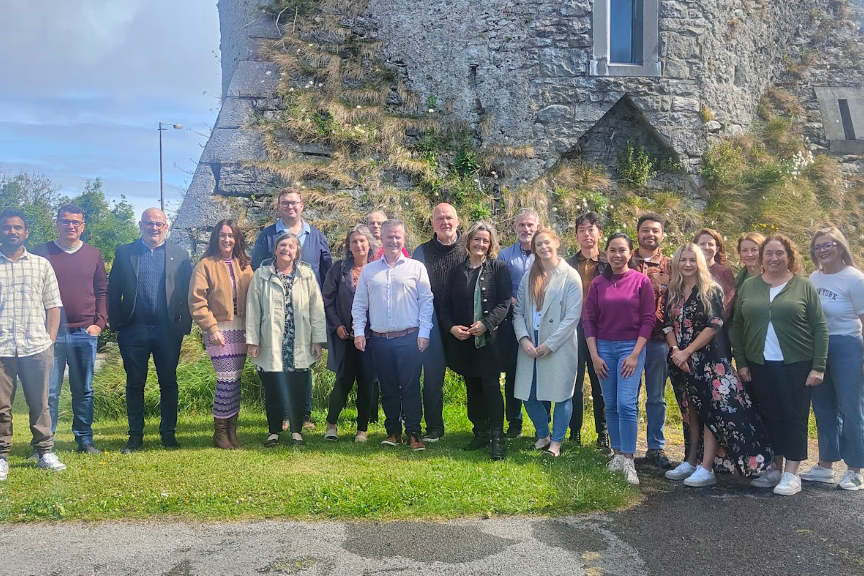Over 30 academics, experts and researchers from across the island of Ireland met at the Burren College of Art in County Clare recently for the first ever ‘Atlantic Futures Summer School’. The two day event welcomed academics from all four partner universities*, representing all six of our ‘Research Streams’-giving them an opportunity to connect with each other, the area and its business leaders, to learn how some of the challenges we are exploring may have been addressed.
Professor Malachy O’Neill, Atlantic Futures co-lead and Director Of Regional Engagement for Ulster University explained
“Our inaugural Atlantic Futures Summer School afforded us a unique platform to share progress and plot next steps in terms of each of the six workstreams but also collectively explore the interdisciplinarity of the overarching project in the unique ecology of The Burren, Co. Clare.
Through direct engagement with local and regional stakeholders we explored the relevance of our research in alignment with UNESCO Sustainable Development Goals and garnered new insights from active practitioners which will inform this important work going forward."
During the two days, researchers spent time with each other, discussing and presenting their work, before spending time engaging with the area’s business leaders to learn how they have approached key challenges
Jonathan Levie, a Professor of Entrepreneurship & Regional Development at the University ofGalway, who was closely involved in the planning of the event, told us,
“We brought everyone to the Burren area for our first summer school event because theinnovative approach to clustering and collaboration by businesses here has had a significant and positive impact in this region. It was invaluable for our team to hear these stories first hand, meet those involved, get a sense of the place and how businesses and communities work together in more rural areas along the Atlantic Corridor to achieve success”
Jarlath O’Dwyer, CEO of the Burren Eco Tourism Network outlined how his organisation had come into existence in 2008, growing to become a 65+ member organisation, which works to collectively market eco tourism in the entire region, whilst heavily relying on one of our key research areas-digitalisation.
“If we were still trying to bring people into rooms we’d probably have a smaller network, but the ability to meet virtually has meant we have been able to enjoy the support of amazing business leaders we thought we’d never get involved, but who have become excellent, supportive members who individually contribute and enjoy the benefits of our collective approach.
Our job is to sell the Burren as a destination. The collaboration between local businesses has evolved massively over the past 10 years, and it’s made a significant impact in the area”
he added, before outlining some accolades and recognition over the past few years including the Lonely Planet ‘Best In Travel’.
The team also spent time on site with Birgitta Hedin-Curtin, co-founder of the Burren Smokehouse, learning how her family run business, first setup in 1989 with her husband Peter, had grown to become one of the most well loved and popular attractions in the Burren area, offering artisan smoked salmon products to customers around the world
Their story in particular offered insight into several areas of our research, including female entrepreneurship, digitisation, scaling, transport and freight connectivity.
Amanda Calderwood, a PhD researcher from Ulster University working on business scaling explained
“What was particularly interesting was the deep sense of place the business owners had and their commitment to high-quality products. They were so proud of their region, and the standard of their products had to reflect the quality of the place. The sessions brought us back to our research, the impact we could make and how we could contribute to the knowledge needed to help businesses grow and thrive.”
This was a view shared by Chethaka Gamage, a fellow PhD researcher based at ATU exploring freight connectivity.
“I gained a deeper understanding of the project's wide-ranging requirements and was inspired by hearing the experiences and challenges faced by entrepreneurs on the west coast of Ireland. We were able to explore how freight connectivity could be used as a strategy to uplift the economy of the region."
Everyone at Atlantic Futures would like to thank the people, organisations and businesses in the Burren for the amazing welcome, warm hospitality and willingness to share insights. Special thanks to Jarlath O’Dwyer from the Burren Eco Tourism Network, Birgitta & Peter Curtin from Burren Smokehouse and Mary Hawkes-Greene from the Burren College of Art. We take a lot away from this trip and look forward to engaging with other communities and business leaders along the Atlantic Corridor in the months and years ahead.
Register your details and keep up to date with Atlantic Futures.
Atlantic Futures is funded by the Higher Education Authority as part of the North South Research Programme. The project is a Shared Island partnership between Atlantic Technological University, Ulster University, University of Galway and University of Limerick.


